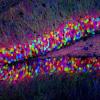from wp: Only one independent study has shown that escitalopram is more effective than citalopram, but in October 2011 it was reported that the company that sponsored the study had links to Lundbeck, the makers.
and so ... why exactly is escitalopram so much better than citalopram? it's basically the same molecule ...
Excellent question!
 RE: ESCITALOPRAM versus CITALOPRAM
RE: ESCITALOPRAM versus CITALOPRAMFirstly, I should point out that there is a rather amusing ongoing 'Handbags At Dawn' battle for dominence between the ESCITALOPRAM camp and the CITALOPRAM camp.

You are absolutely correct that there currently exists only a limited quantity of conclusive substantiated studies demonstrating the superiority of ESCITALOPRAM to CITALOPRAM, in relation to EFFICACY and/or SIDE EFFECTS, however, it
does exist; and the superiority is further supported through clinical practice.

However, I agree that it certainly would be a lot more helpful if MORE studies were conducted specifically comparing the two
at that various dosages, including 5mg, 10mg, 15mg and 20mg doses; wherein, the difference between the two would be clearly demonstrated to be profound with regards to the
5mg dosage.

Please kindly note that to state that CITALOPRAM is “the same molecule” as ESCITALOPRAM is factually incorrect, in that:
CITALOPRAM = (RS)-1-[3-(dimethylamino)propyl]-1-(4-fluorophenyl)-1,3-dihydroisobenzofuran-5-carbonitrile
ESCITALOPRAM = (S)‑1‑[3‑(dimethylamino)propyl]-1‑(4‑fluorophenyl)-1,3‑dihydroisobenzofuran-5‑carbonitrile
CITALOPRAM comprises a racemic mixture (1:1) of both ENANTIOMERS (
S-[+] and
R-[-])
ESCITALOPRAM contains only the
S-(+)- ENANTIOMER
Research has demonstrated that the ACTIVE COMPONENT is responsible for both CITALOPRAM and ESCITALOPRAM’s pharmacological effect (in relation to ANXIOLYTIC ANTIDEPRESSANT) is the
S-(+)- ENANTIOMER, and NOT the
R-[-] ENANTIOMER.
Hence ESCITALOPRAM can be considered
purer than CITALOPRAM in that it ONLY contains the
S-(+)- ENANTIOMER, whereas CITALOPRAM does indeed also provide the
S-(+)- ENANTIOMER, but also the
R-[-] ENANTIOMER which does have its own physiological effects, but not relating to ANXIOLYTIC ANTIDEPRESSANT effects, but instead relating to increased potential for undesirable SIDE EFFECTS, which is not present with the ESCITALOPRAM because it does not contain the
R-[-] ENANTIOMER.

Think of
DL-PHENYLALANINE versus
L-PHENYLALANINE… Do both yield identical physiological effects? Well, I’ll let you answer that one…

See the following meta-analysis (= bulk review) of the various numerous clinical studies to date reported superiority regarding ESCITALOPRAM versus CITALOPRAM in both EFFICACY and ADVERSE EFFECTS, ranging from “SLIGHT” to “DOUBLE” to the difference:
Croat Med J. 2010 February; 51(1): 61–73
Is Escitalopram Really Relevantly Superior to Citalopram in Treatment of Major Depressive Disorder? A Meta-analysis of Head-to-head Randomized TrialsVladimir Trkulja
Source
Department of Pharmacology, Zagreb University School of Medicine, Zagreb, Croatia
EXTRACT FROM FULL TEXT:
“the risk of discontinuation of treatment due to [ADVERSE EFFECTS] AE or inefficacy during the initial period of up to 8 weeks was slightly lower with escitalopram [versus citalopram]”; and
“Discontinuations due to inefficacy were twice more frequent with citalopram than with escitalopram”.I hope this helps clarify matters! 
Edited by ScienceGuy, 06 February 2012 - 02:26 PM.



















































